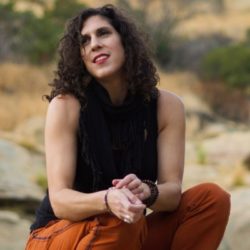
Arielle Silver
Singer/Songwriter
Cultural Artists Spotlight: April 8 – April 21, 2020
1) Can you tell us a little bit about what you do?
I’m a performing singer/songwriter, and I also write essays, poems, and stories. In alternating phases, my music or literary work will move to the forefront of my life. For the past year or so, music has been my primary focus, as I wrote new material, recorded, and began promotion for my fourth album, which is slated for release in July 2020.
The connecting threads that run through my creative writing of both songs and literary work, and my other passion for yoga, is story, attention to detail, and the attempt to parse clear truth from confusing narratives. Everyday, the goal is to bring a single moment or detail into sharp focus, with awareness of the edges of where that detail touches the next, and the bigger picture beyond. I believe that the micro, when magnified, can illuminate some aspect of a universal experience or truth. Clear-eyed vision of the micro moment can offer a solid place to stand until the fog in the next moment clears.
2) How did you first become interested in music and writing?
I don’t remember actually learning to read or create melody — both emerged organically for me, at an earlier age than my memory can recall. From my babyhood, my dad strummed guitar and together we sang his favorite tunes from Joni Mitchell and Paul Simon and more. My mother was always a voracious reader, and though we had filled bookcases, every week she would also bring home armloads of library books. Reading, journaling, and singing were my favorite pastimes. Still are. Our home wasn’t a particularly peaceful place, but through music and stories I entered all kinds of other worlds. Early on, I learned the infinite pathways of adventure and self-understanding available to us through imagination.
My formal music education began in elementary school, with violin when I was seven, clarinet lessons when I was eight, and in middle school oboe, saxophone, and piano. I also took my first creative writing class in middle school. This was public school, nothing fancy. On band days, every kid at the bus stop carried some kind of unusually shaped black case. You could hear the piano from the chorus room in the school halls, and in high school our choir sang in Carnegie Hall with John Rutter conducting and the New York Philharmonic as our orchestra. At the time, I assumed all kids had those opportunities. Now I realize them for the treasure they were – rare and invaluably important.
In college, I took a few art classes – painting, sculpture, and drawing. I do not have much talent for the visual arts, but I loved the challenge of using a new part of my brain, and the sensory experience of pushing oil paints across a canvas. I think often of something I overheard one of my painting professors say to that year’s TA [teaching assistant]: “I keep hearing the students complain about how frustrated they are. Don’t they realize frustration is the point?” Through art, we learn how to be frustrated, seek a new perspective, and come up with a solution. No one can solve that for us, and that is where the problem-solving muscle gets stronger. I learned more from my music, art, creative writing, and theater electives about paying attention, parsing signal from noise, and creative problem solving than from any of my academic classes.
3) How does art enrich a community, and what are some ways people can engage with art in Burbank?
Music, literature, art, theater. The arts build essential cross-neural pathways. They teach indispensable lessons about critical understanding of the self and the world. And the cathartic elements cannot be undervalued. Not all art will speak to all people. But it is invaluable to our psychological wellness when we find a song, story, play, painting, or dance that taps on a bruise in our hearts. Those moments help us to know that no matter how isolated we might feel in our experiences, we are not alone. The artists creating those works are lighthouses in the dark, and sometimes literal lifesavers for a drowning soul.
4) If you could share with our community one thing about art, what would it be?
Art is human made, and it’s a mirror for our humanity. For wellness on many levels, as artists and creative spirits of all kinds, I believe we would benefit from shifting away from “striving for perfection” and instead strive for wholeness. We are not computers, and that is our greatest beauty. The idea of perfection – that is, something without so-called errors – leads us to arbitrarily reject aspects of ourselves. What we can learn from artistic expression is that heartache comes in the blue notes, realization in the pause, response in the silence, truth in the complex. Perfection wants to smooth these so-called blips. Art helps us celebrate how we are gloriously, painfully, temporarily, organically, and ever-changingly alive.
To find out more about Arielle’s work, visit her website.
